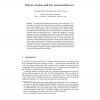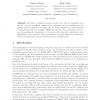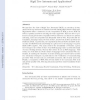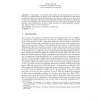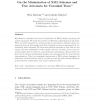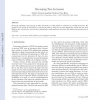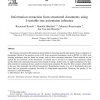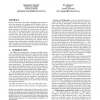159
click to vote
CAV
2011
Springer
14 years 5 months ago
2011
Springer
Abstract. The underground malware-based economy is flourishing and it is evident that the classical ad-hoc signature detection methods are becoming insufficient. Malware authors ...
168
click to vote
MST
2011
14 years 9 months ago
2011
: We define a weighted monadic second order logic for unranked trees and the concept of weighted unranked tree automata, and we investigate the expressive power of these two conce...
134
click to vote
IANDC
2011
14 years 9 months ago
2011
We introduce the class of Rigid Tree Automata (RTA), an extension of standard bottom-up automata on ranked trees with distinguished states called rigid. Rigid states define a res...
116
click to vote
JUCS
2002
15 years 1 months ago
2002
Abstract: In this paper we introduce the concept of the quasi-product of tree automata. In a quasi-product the inputs of the component tree automata are operational symbols in whic...
119
click to vote
JCSS
2007
15 years 2 months ago
2007
Automata for unranked trees form a foundation for XML schemas, querying and pattern languages. We study the problem of efficiently minimizing such automata. First, we study unrank...
136
click to vote
IPL
2008
15 years 2 months ago
2008
Streaming validation and querying of XML documents are often based on automata for tree-like structures. We propose a new notion of streaming tree automata in order to unify the t...
167
click to vote
DKE
2006
15 years 2 months ago
2006
Information extraction (IE) addresses the problem of extracting specific information from a collection of documents. Much of the previous work on IE from structured documents, suc...
115
click to vote
CORR
2010
Springer
15 years 2 months ago
2010
Springer
Simulations of weighted tree automata (wta) are considered. It is shown how such simulations can be decomposed into simpler functional and dual functional simulations also called f...
125
click to vote
CORR
2010
Springer
15 years 2 months ago
2010
Springer
Previous work reports about SXSI, a fast XPath engine which executes tree automata over compressed XML indexes. Here, reasons are investigated why SXSI is so fast. It is shown tha...
115
click to vote
ACTA
2010
15 years 2 months ago
2010
This paper describes an effective verification procedure for imperative programs that handle (balanced) tree-like data structures. Since the verification problem considered is unde...
